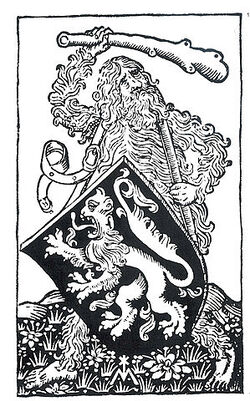Wild man (nonfiction): Difference between revisions
Jump to navigation
Jump to search
No edit summary |
|||
| (One intermediate revision by the same user not shown) | |||
| Line 1: | Line 1: | ||
The '''wild man''' (also '''wildman''', or "wildman of the woods", | [[File:Wilder_Mann_mit_umgehängtem_Wappen_1487.jpg|250px|thumb|Wilder Mann mit umgehängtem Wappen (1487).]]The '''wild man''' (also '''wildman''', or "wildman of the woods", | ||
The wild man appears in the artwork and literature of medieval Europe. | The wild man appears in the artwork and literature of medieval Europe. | ||
| Line 9: | Line 7: | ||
The defining characteristic of the figure is its "wildness"; from the 12th century they were consistently depicted as being covered with hair. | The defining characteristic of the figure is its "wildness"; from the 12th century they were consistently depicted as being covered with hair. | ||
== | == In the News == | ||
<gallery mode="traditional"> | |||
File:Wild Man in Hydrogen Bubble Chamber.jpg|link=Time travel (nonfiction)|Inventor of [[Time travel (nonfiction)|time travel]] travels to distant past, goes insane, becomes own ancestor -- not necessarily in that order. | |||
</gallery> | |||
== Fiction cross-reference == | == Fiction cross-reference == | ||
| Line 15: | Line 17: | ||
* [[Salvatore]] | * [[Salvatore]] | ||
== External links | == Nonfiction cross-reference == | ||
External links: | |||
* [https://en.wikipedia.org/wiki/Wild_man Wild man] @ Wikipedia | * [https://en.wikipedia.org/wiki/Wild_man Wild man] @ Wikipedia | ||
Latest revision as of 20:01, 13 July 2016
The wild man (also wildman, or "wildman of the woods",
The wild man appears in the artwork and literature of medieval Europe.
He is comparable to the satyr or faun type in classical mythology, and to Silvanus, the Roman god of the woodlands.
The defining characteristic of the figure is its "wildness"; from the 12th century they were consistently depicted as being covered with hair.
In the News
Inventor of time travel travels to distant past, goes insane, becomes own ancestor -- not necessarily in that order.
Fiction cross-reference
Nonfiction cross-reference
External links:
- Wild man @ Wikipedia

